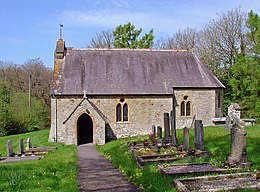Meline, Pembrokeshire
| Meline | |
|---|---|
 Church of St Dogfael | |
Location within Pembrokeshire | |
| OS grid reference | SN118388 |
| Principal area | |
| Country | Wales |
| Sovereign state | United Kingdom |
| Post town | Crymych |
| Postcode district | SA41 |
| Police | Dyfed-Powys |
| Fire | Mid and West Wales |
| Ambulance | Welsh |
| UK Parliament | |
| Senedd Cymru – Welsh Parliament | |
Meline (also recorded as Meliney and Melinau) is a parish in the Diocese of St David's in north Pembrokeshire, Wales. There is no settlement of this name.
History
[edit]While there is no settlement called Meline, the name may refer to a mill on one of the rivers that run through the north of the parish, including the Nevern and Brynberian.[1] Meline (as Malenay) appears on a 1578 parish map of Pembrokeshire.[2] The parish was in the ancient Hundred of Cemais and in 1833 was described as including some ancient mansions as well as prehistoric features.[3] In 1835 the parish had a population of 492 of which 30 or 40 attended Sunday School in the summer months.[4] By the 1870s the population had fallen to 414 people, living in 108 houses and fell to below 300 in the mid-20th century.[5] At the turn of the 20th century Meline was sharing a Board School with Whitechurch (Eglwyswen).[6]
Parish
[edit]The parish, with an area of 4,523 acres (1,830 ha), includes the hamlet of Crosswell, a number of other minor settlements and farms, and extends southwards into the Preseli Mountains.[1] It is mostly within the Pembrokeshire Coast National Park.[7]
The former parish church, in the northern tip of the parish,[1] is dedicated to St Dogmael (or Dogfael) and is a Grade-II listed building. It was built in 1865, replacing an earlier structure, possibly 13th century, some of which was incorporated into the present church, including the font.[8][9]
In 2017, the church was vested in the care of Friends of Friendless Churches, a charity that rescues redundant churches across England and Wales.[10]
A carved pew back from the earlier church is preserved at Penbenglog nearby, bearing the inscription (in Latin) "The pew of Matilda, wife of George Perrott, of Penybenglog, gentleman, 1626".[11] Penbenglog is a Grade-II listed house dating from the early 17th century, with earlier origins, and one of the oldest continuously-occupied sites in north Pembrokeshire.[12][13]
Notable people
[edit]Benjamin Evans (minister) (1740-1821) was born in the parish.[14]
References
[edit]- ^ a b c "GENUKI: Meline parish map". Retrieved 19 April 2015.
- ^ "Penbrok comitat". British Library. Retrieved 22 July 2024.
- ^ "GENUKI: Meline". Retrieved 19 April 2015.
- ^ Parliamentary Papers, House of Commons and Command. Vol. 43. HMSO. 1835. p. 1314.
- ^ A Vision of Britain through Time: History of Meline in Pembrokeshire. GB Historical GIS, University of Portsmouth. Retrieved 11 September 2016.
- ^ "Meline and Whitechurch School Inspection". The County Echo. 15 September 1904. Retrieved 11 September 2016.
- ^ "GENUKI: St Dogfael, Meline, Church in Wales". Retrieved 19 April 2015.
- ^ "British Listed Buildings: Church of St Dogfael". Retrieved 25 January 2018.
- ^ Cadw. "Church of St Dogfael (Grade II) (19167)". National Historic Assets of Wales. Retrieved 26 July 2019.
- ^ "Friends of Friendless Churches: Meline". Retrieved 21 December 2018.
- ^ An Inventory of the Ancient Monuments of Wales and Monmouthshire: VII - County of Pembroke. 1925. p. 226. Retrieved 10 September 2016.
- ^ "British Listed Buildings: Penbenglog". Retrieved 25 January 2018.
- ^ Cadw. "Penbenglog (Grade II) (19168)". National Historic Assets of Wales. Retrieved 26 July 2019.
- ^ "Evans, Benjamin". Dictionary of Welsh Biography. National Library of Wales. Retrieved 10 September 2016.

